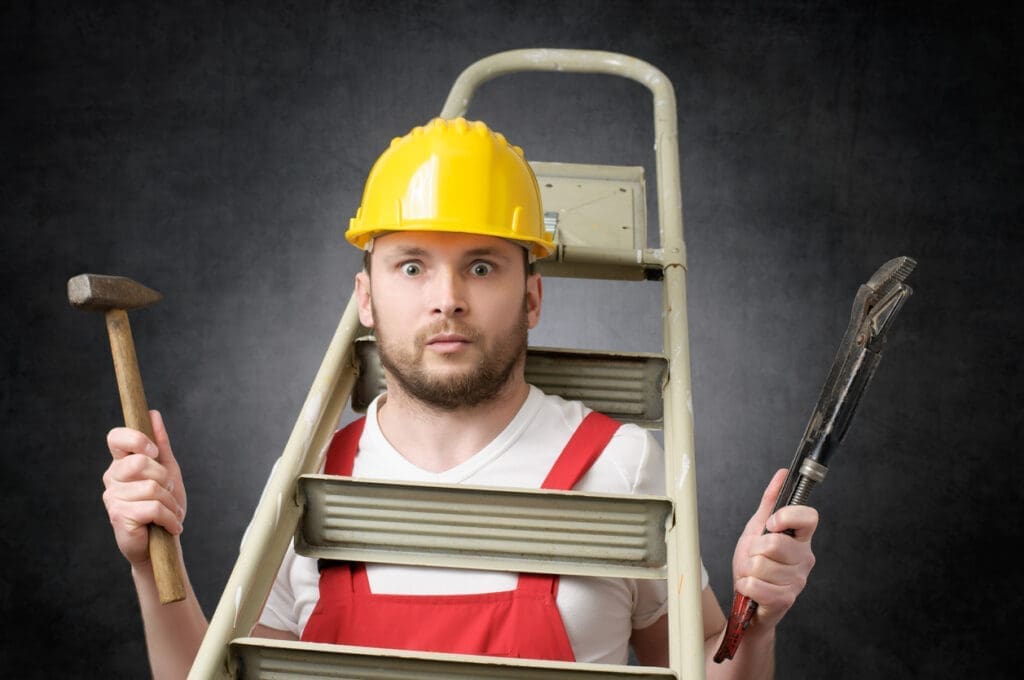
Plumbing can present many hazards, so it’s essential to be aware of plumbing safety tips to ensure that the job gets done correctly and that you’re safe in doing so. To ensure the safety of our team and any homeowners doing a DIY project, we’ve compiled a list of plumbing tips everyone should know. Here’s a closer look:
Plumbing Dos:
Before starting any plumbing project, follow the steps below to ensure you are following plumbing safety tips. Also, before getting started, be sure to factor in the amount of time necessary to complete the project, research potential problems and solutions for each step, and what tools you’ll need.
Protecting Yourself
It’s crucial to ensure you are protecting yourself when working on a plumbing project. Even if you are a professional with decades of experience, the unexpected can always happen, so it’s best always to be prepared.
Protect Your Eyes
When doing anything involving plumbing, be sure to protect your eyes. Invest in a pair of safety glasses to wear at all times, especially when using a drill, hammer, or saw.
Protect Your Hands
Plumbing projects often involve chemicals and other materials that should not come into contact with your skin. Therefore, it’s essential to wear long sleeves and gloves to avoid causing burns to your skin.
Protect Your Head
Wearing a hard hat isn’t always necessary, but it’s better to be safe than sorry, so always have one handy in case. Also, it will be mandatory if you are ever working on a construction site, so be prepared.
Protect Your Lungs
Projects will sometimes expose you to mold, which, when inhaled, can cause you to get very sick. If a project you are working on has the potential to expose you to mold or other dangerous fumes, be sure to wear a mask as an added layer of protection.
Protect Your Feet
Often shoes are an afterthought, but when working on plumbing projects, there may be puddles or spills, so slip-resistant boots are essential.
Shut off the Water
If there is any chance that your project will involve water, it’s always best to shut it off in advance. You want to avoid panicking about turning off the water midway through a project, so just add the step of turning it off to your to-do list.
Be Informed
When you start a project, you want to ensure you can finish it without delays. One way to ensure you don’t have outside delays is to check local building and plumbing codes. Some projects will need a licensed plumber or a permit, so be sure to check before getting started, so you don’t have to stop before it’s completed. Your local codes can be found on your state’s Department of Health website. For those based in Louisiana, click here.
Practice Tool Safety
Never use a tool, especially a power tool, without looking for the manufacturer’s recommendations. If you are unsure how a particular tool works or how to use the tool best, do some research or contact a professional to keep you and those around you safe.
Read Labels
Always read labels and instructions for any products you use for your project. Be sure to follow the recommendations for use, be aware of any warnings, and know what to do in an emergency.
Think Before Opening a Drain
Opening a drain can be dangerous and messy, so think before acting. Be sure to check that the pipe will not drain toward you, be prepared for pressure inside if you pull apart a clogged drain, and prepare yourself properly for the next steps. It’s important to note that when a drain is opened, it can turn into a sewage hose and spray contaminated and pressurized water over the property. This is a dangerous and costly mistake so in most cases, if you need a drain opened, leave it to the professionals.
Plumbing Don’ts:
Now that you know what to do when starting a plumbing project keep reading to learn what to avoid.
Ignore Requirements
If you are starting a project and realize only some things are up to code or following requirements, do not proceed. Those requirements are put in place for the safety of everyone in the home, so do not ignore them under any circumstances. If you have questions about specific requirements, call a professional like the team at Goodbee Plumbing.
Misuse Tools or Equipment
Similar to the above, it’s essential to become familiar with the tools and equipment you will use. The misuse of these tools can lead to injury and more significant damage. Additionally, if you already have tools, test their condition before starting a new project since poorly maintained tools can also be a safety hazard.
Ignore the Smell of Gas
If at any point you smell natural gas or suspect a gas leak, you must immediately stop what you are doing. If you can safely turn off the gas, you should. However, if you cannot, evacuate the premise and call your gas company. Under no circumstances should you try to find the leak yourself.
Cut Blindly
Before beginning any project requiring you to drill into the wall, ceiling, or flood, evaluate what is behind the surface. You want to make sure you are avoiding electrical wiring and ductwork. Don’t risk it when it is doubt and call a professional to prevent spending more money fixing the mistake.
Call a Professional for Your Plumbing Needs
Whether you have questions about a DIY project or looking for a professional who is up to date on all safety requirements, contact Goodbee Plumbing. We are a locally owned and operated plumbing company that takes pride in providing fast and reliable service. If you want to work on a project, check out our blog, where our experts provide DIY tips and tricks to streamline your projects! We also have a Tips and FAQ page to help answer your questions.
Want to know more? Contact us today!
